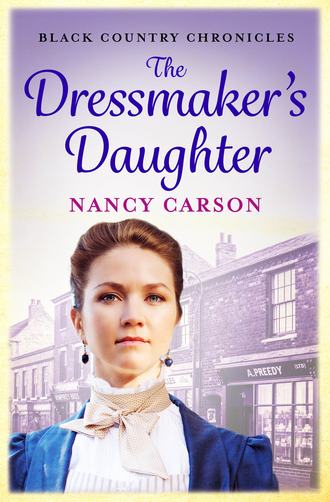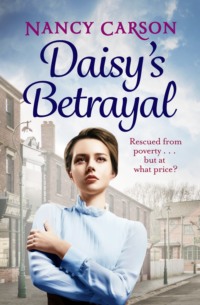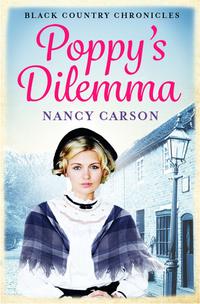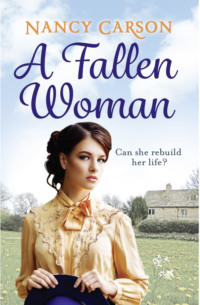
Полная версия
The Dressmaker’s Daughter
‘Pawn shop? I don’t want other folks’s left-offs, Joe. I’d rather have new.’
‘We’ll buy some new things, May. We’ll buy a new bed. But as regards the rest, we’ll have to see how we’m fixed for the old spondulicks.’ He peered into the coal scuttle as an afterthought. ‘Bugger me, this blasted thing’s empty again. Every time I look it’s soddin’ empty. Our Lizzie, fetch some coal up, my wench, and I’ll give yer a silver threepenny bit.’
‘Go yourself and keep your silver threepenny bit.’ There was sisterly contempt in her voice. ‘Why should I get all mucked up? Aunt Sarah and Uncle Tom will be here in a minute.’
May raised an eyebrow. ‘Not to mention Stanley.’
Lizzie glanced guiltily at her mother, but Eve had heard nothing. It was then that they heard footsteps in the entry, and Lizzie’s heart started to pound.
‘Aye up. Sounds like they’m here now,’ Joe said, disappearing into the cellar with the coal bucket.
The back door opened and in walked Tom and Sarah. Tom sat himself in the armchair and Sarah sat on its arm, her back towards her husband while they talked. Joe returned from the cellar, heaving the bucket of coal. He set it down on the hearth and made up the fire while Lizzie waited for Stanley to come in. But there were no more footsteps in the entry. No more opening of the back door. The flutter of excitement under her rib cage became an ache. Usually, either Stanley or Sylvia accompanied their mother and father. Tonight, there was neither. Lizzie felt a fervent desire to cry out. Where was Stanley? Why hadn’t he come? But conversation about May’s and Joe’s plans was already in full spate, so she let it be.
‘Well, I reckon as we should go and have a drink on it,’ Tom suggested. ‘Let’s pop up The Junction and celebrate.’
‘That’s all you think about,’ Sarah complained. ‘Beer, beer, beer. I wonder as you don’t drown in it.’
‘No, that’s a bostin’ idea, Tom,’ Joe agreed. ‘Gi’ me a minute to wash me hands. Come on, Mother. Get your lid on. We’m off for a drink to celebrate.’
So everybody, except Lizzie, began sprucing themselves up and smoothing the creases from their clothes. When they were about to leave, Tom asked her why she wasn’t joining them.
‘I’m not old enough to sit drinking in public houses.’ She felt desperately sorry for herself.
‘You can sit in the children’s room, my darlin’. I’ll bring you some pop.’
‘The children’s room? No thanks, Uncle Tom.’
‘But it’s a celebration.’
Lizzie preferred to stay at home. Stanley was sure to arrive sooner or later. After all, he’d promised. She would wait, and be alone with him when he did arrive.
*
But Stanley broke his promise. He did not come to see her that evening; nor the following Sunday evening at church; nor on the Wednesday after that when his parents came visiting again. Stanley wasn’t even mentioned. His continued absence stung Lizzie. If he cared anything at all he would surely have appeared by this time and apologised for not being able to see her before. His feelings on that first Sunday evening of July were too obvious for her to be mistaken. And yet she must have been mistaken. She must have misinterpreted his signals. Something did not add up. Something was wrong, and she couldn’t fathom it out. Had he been merely stringing her along? Was he practising on the nearest girl to see how she might respond to his advances? Perhaps he was. But she could have sworn …
Lizzie decided that next Wednesday when the Dandos came round she would be out. She would be out returning the compliment, visiting their house in the hope that Stanley would be at home. She had to see him; this not knowing was driving her mad. The least she deserved was an explanation. Besides, she knew Stanley well enough to be able to visit him uninvited.
Or did she? This intimacy, which had befallen them so easily, had changed everything. Somehow, it complicated their accessibility to each other, which they could have freely enjoyed before. Lizzie was no longer sure of her ground. But she just had to know whether he loved her.
By the time Wednesday came round again, the weather was uncomfortably hot and humid. The whole country was sweltering in the grip of an intense heat-wave. Lizzie wore a cotton shirt and light cotton skirt. Her long underskirt seemed to stick to her moist, bare legs in the heat, and she wished the day would come when cooler, shorter skirts might be considered seemly. In this sort of weather they would certainly be more comfortable. She stood talking to Gert Hudson and Ida Wassall in Cromwell Street, her hair elegantly done, while she discreetly awaited the arrival of Tom and Sarah. When she saw them she waved but, as she’d anticipated, neither Stanley nor Sylvia accompanied them. So she took her leave of Gert and Ida, and made her way to the Dando’s house.
Certain that this contrived meeting would sort things out and thus settle her mind, Lizzie strode purposefully on. As she turned into Pitfield Street, where Phyllis Fat lived, half a dozen small children were playing in the gutter, throwing stones at a passing cat. One of them was naked, the rest in rags, their faces grubby, their hair matted with filth. The street was long and narrow, with a long line of crumbling back-to-back terraced houses on each side. Chimneys leaned precariously, slates were missing from the roofs, and paint peeled from faded front doors and window frames. A few people, mostly elderly, sat on the steps of their open front doors in open-mouthed, toothless silence. In some houses the floor was dirt – no quarries, no floorboards, no linoleum. Coal was heaped under the table in those houses that had a table. Often, Eve had warned Lizzie not to venture down Pitfield Street alone, but no ill had ever befallen her. It cheered her to see the occasional house with sparkling windows bedecked with pretty curtains and a bunch of fresh flowers, and a front step conscientiously whitened at those houses where respectability defied poverty.
As she left it all behind her and walked on to Dixons Green Road, the contrast was marked. Dixons Green was where the well-to-do merchants of the town had established substantial homes. And, although there was a malthouse opposite The Shoulder of Mutton, it did not intrude.
Lizzie walked on, past The Bush Inn, an old public house with a wooden porch on the front that reminded her of a pigeon loft. Men wearing collarless shirts and braces were leaning against the wall and railings outside, drinking beer, laughing, swearing, enjoying the warm weather, and several of them whistled and hooted after her. From here you could look west and, on a clear day, see the green Clent Hills, but the humidity and stillness of the last few days meant that the atmosphere was thick and hazy now. You could see no further than the old mine workings and pit mounds of Mudhall Colliery, grey and foreboding against the reddening sky; and the old Buffery Clay Pit at the bottom of the hill. And this scarred and barren landscape, relieved only by the tower of St. Peter’s church, a hazy silhouette in distant Netherton, was overlooked by the Dandos.
As she turned into Grainger Street, Lizzie’s pulse was racing. She had arrived. The Dando’s home was fairly new, built only in 1903. The windows gleamed and an aspidistra sat majestically in a shining, brass pot in the centre of the front room window. They had their own gate at the top of the entry and a private back yard, too, with a garden and flowers that Sarah tended with loving care. Nervously, Lizzie tip-toed through the entry, quietly opened the gate on the right, and walked onto the foreyard. She tapped tentatively on the back door, feeling weak at the knees, wishing now she hadn’t come and hoping that even though she had, Stanley would not after all be at home. After all, there was still Jesse Clancey. She could always turn her attentions to Jesse.
She waited, and was just about to turn tail and run, when the door opened a fraction. Sylvia’s flushed face appeared, bearing a sheen of perspiration.
‘Lizzie!’ She stepped outside and Lizzie could see that her hair was untypically ruffled. She held her stomach in to tuck her blouse into her skirt. ‘What brings you here? Mother and Father have gone up to your house. Is there anything wrong, Lizzie? D’you want to come in?’
‘No, no, Sylvia.’ She was retreating backwards slowly down the entry. ‘I … I just thought I might see Stanley, that’s all … If he’s not in, it doesn’t matter.’
‘Our Stanley went out, Lizzie. I expect he’s out with his mates for a last drink. Can I give him a message?’
Still retreating, Lizzie shook her head. ‘No, it’s all right, Sylvia …’
At that moment, a man appeared at Sylvia’s side, and peered intently into the entry. Lizzie gasped. It was Jesse Clancey. His blonde hair was tousled also, his shirt crumpled. As soon as he could make out Lizzie in the dimness of the entry, he ran his fingers through his hair to try and smarten it up.
‘Oh, it’s Lizzie Bishop,’ he said. ‘How are you, Lizzie?’
‘I’m all right, Jesse, thank you.’ She was bitterly disappointed to see him there. She noticed he had no shoes on.
‘Good. Fancy a glass of beer with us?’
‘No, Jesse … Thank you. I’d best be getting back.’
She made the conscious decision then to turn and walk away with as much dignity as she could muster. The sound of her own footsteps seemed deafening as they echoed through the entry. Now her frustration was complete. Not only had she failed to see Stanley, and broadcast to his sister and to Jesse Clancey that she was actively seeking him, but she had also discovered that Jesse was intimately involved with Sylvia. What could he possibly see in her? He couldn’t possibly be in love with her.
Lizzie felt foolish. It was evident now to even a blind man that Stanley was not interested in her. She had made a big mistake by allowing herself to be enticed by his insincere show of interest in the first place. And what did Sylvia mean by saying that Stanley was out having a last drink?
What if she’d been just a bit more responsive to Jesse that Sunday evening? What if she’d plucked up the courage to actually strike up a conversation with him instead of smiling coquettishly and making stupid cow eyes at him? Would he have asked her out, even though she was so much younger? Or would he still have arranged to see Sylvia? But he had not asked her, so it hardly mattered. In any case he could never really be a serious contender since his father was indirectly responsible for her own father’s death. She could never justify it. And their mothers, with their insane rivalry, would never allow it anyway. Nobody would condone it. There were just too many impediments.
She climbed Buffery Road’s steep incline, feeling hot, uncomfortable and miserable. She felt like crying when she arrived home, fraught and in despair. Her skin was clammy, sticky with the humidity, and she wanted to lie in a bath-tub full of cool water. She hoped that Sarah and Tom might have taken her mother to The Junction, so she could have some time to herself for a while, to cry, to think, to calm down, to sort out her bewilderment. But, as she opened the back door, she could hear her Uncle Tom’s booming voice. She groaned inwardly, but forced a smile.
‘Oh, I’m that hot,’ she declared flatly, trying to hide the turmoil inside her. ‘I’d give anything to stand in the cut for half an hour.’
‘Where’ve you been?’ Eve asked. ‘We was wondering what had happened to you?’
Lizzie shrugged. ‘I called to see Stanley.’ It was a reckless admission, but she was too hot and too miserable to care. ‘He wasn’t in, though.’ She resisted the urge to mention that Sylvia and Jesse Clancey were having an intimate evening of it.
‘You won’t be seeing much of our Stanley in future, Lizzie,’ Tom said. ‘He’s took the king’s shilling and signed up. I was just telling your mother as he’s off to start his training tomorrow. He’s got to be up at the crack of dawn to catch the train. I reckon as he’ll be sent to the Cape, you know.’
The Cape? South Africa? But Stanley had mentioned nothing about joining the army.
‘Or India,’ Sarah suggested with a hint of discontent.
‘Or India. Either road, it’s one way of seein’ the world. It’ll mek a man of him. We’ll miss him, though.’
So that was what Sylvia meant when she said he’d gone out for a last drink. ‘What made him decide to do that, Uncle Tom? Was it sudden?’
Tom glanced at Eve. Sarah in turn looked at him, awaiting his answer.
‘Well, you know what young chaps am like, these days.’
Chapter 3
May Bradley and Joseph Asa Bishop were married on New Year’s Day, 1907. Only a few guests – close family of the bride and groom, the Dandos, and Beccy and Albert Crump from next door – were invited to their new home for some liquid refreshment afterwards. Albert uttered not one word about the evils of drink, in deference to May’s family, whom he did not know and had no wish to alienate, while he supped cups of tea. But, while he anxiously listened to his wife singing raucously after drinking several glasses of port, he believed it might behove him to register his avowed disapproval. So he gave her a glance conveying notice of the divine retribution about to be visited on her if she did not shut up and regain her dignity. At about midnight the newly-weds were left to enjoy their first night together, after Grenville and Ted had made an apple-pie bed for them, with biscuit crumbs liberally folded in for good measure.
So Eve and Lizzie were finally left to themselves in their little house, which had, over the years, been so crowded with family that there was barely room to move. Lizzie soon took advantage of Joe’s departure by moving into the larger of the two front bedrooms. Eve reflected that as each year passed, so the population within had decreased; as each in turn left, or was taken by the good Lord, the quieter it became. No day passed, though, when Joe or May would not call to see them. Because May continued to work, Eve took on the extra task of doing their washing, for which Joe paid his mother handsomely. He was aware that the loss of his wage would hit them hard. Lizzie was the only one now earning any money at number 48, and her wage was barely enough to keep them in starch. His mother, approaching sixty, could hardly be expected to find a job, though many women her age worked. In any case, Joe vowed he would not allow her to. As far as he was concerned she’d done a lifetime’s labour rearing her children and looking after a husband whom Joe, these days, was not sure had been everything that a husband should be.
May, too, was considerate. She would buy an extra couple of chops, or an extra half dozen eggs, especially for Eve and Lizzie. It pleased her to do so, since she felt closer to her mother-in-law than to her own mother. In any case she could afford it. She would pay for a quart of lamp oil from Theedhams whenever Lizzie said they needed any, and send round two plated dinners of a Sunday, to save Eve the trouble and expense of a Sunday joint.
Ted and Grenville usually called to see their mother at a weekend, Grenville on a Saturday when Wolverhampton Wanderers were playing away. Ted’s day was a Sunday when his shop was shut. Between them, they donated what they could to the welfare of their mother and youngest sister.
Even their kindness, however, was insufficient to maintain them in anything like a comfortable existence, and it was especially hard on Eve. Although Isaac had been nothing less than a swine in many respects he always turned his money up. Consequently, they’d always lived well, though he’d never saved; gambling and drink had devoured all his spare cash. Now, things were different. Eve thought she might be entitled to some parish relief, but the indignity of having to ask precluded her from getting it. So she struggled on, managing with what they had, with what was donated, and with what could be bought cheaply.
New clothes were out of the question. Fortunately, Eve could mend and alter the old clothes that remained in the house in abundance, cast-offs from the departed members of the family. Shoes were more of a problem, though; Lizzie wore out shoes quickly, having to walk the mile or so to and from work every day. During the summer Eve took care of every last penny, conscious that come the winter, they would need extra coal to keep warm.
Lizzie realised she was destined to live with her mother for the foreseeable future, even when she eventually wed, and the man she married would have to accept it. Indeed, it would have to be a condition of marriage.
It surprised Lizzie that Tom Dando was so consistently kind to her mother. His Wednesday evening visits with Sarah continued with a regularity that was almost monotonous. Fridays also, on his way home from work, he would hand money to Eve and tell her it was a bit of pension from Turner’s Brass Foundry. Tom’s own family were all grown up and gone, with the exception of Sylvia, so he evidently felt he could afford to help Eve.
Lizzie asked her mother why it was that Tom seemed to favour her so much.
‘Oh, when we was young, your Uncle Tom was sweet on me.’ Her eyes smiled distantly at the recollection of it. ‘In fact, when I married your father it broke his heart.’
‘But they were cousins, Mother.’
‘Well, that was neither here nor there, our Lizzie.’ Eve folded up the newspaper she’d been reading. ‘Me and your Uncle Tom was sweethearts afore ever I met your father – I was a handsome fleshed madam in them days, though I say it meself, and I had one or two nice, young men after me. Tom’s two years older than me and I knew then what a lovely chap he was, even though I was only just eighteen.’
Lizzie leaned towards her mother’s better ear. ‘So how did you meet my father?’
‘At their old Uncle Eli’s funeral. Tom took me to show me off to his family. We’d been courtin’ a long while. It was there as I met your father all done up in his best black suit and best bowler. Oh, our Lizzie, I only clapped eyes on him and I knew as I’d marry him. He was a lot older than me – about twenty-six at the time – but they said as how he was still a bachelor and a right one for the women, an’ all. Well, when we’d gone back to their uncle’s house for the wake, Isaac come a-talking to me and Tom. After a bit, Tom went to get himself another drink, and Isaac told me how lovely I looked and how as he’d love to kiss me. I remember I blushed to me roots, but there was something about him as took me fancy. After that I kept on thinking about him, even when I was with Tom. Anyroad, afore long I met him again, and I was all of a tiswas. Well, he asked me if I’d meet him one night. So I did, unbeknowns to Tom. I enjoyed meself that much I said I’d see him again and, afore I knew what’d hit me, I was in love – well and truly … and I reckoned I could cure him of his womanising. Anyway, when I told Tom what’d been going on he was heartbroken.’
‘So were they friends after that, Uncle Tom and my father? I wouldn’t have been very pleased if a cousin of mine had stolen my man.’
‘Well, they weren’t very friendly when it first happened, our Lizzie, I can tell you, but they still worked together. They had to. Jobs was scarce in them days and they had to put up with one another, ’cause they worked as a team. But, when Tom met Sarah, they patched up their differences. Tom never forgave your father, though, for pinchin’ me off him. Even the day I got married he told me as he’d always love me.’
‘And did you cure my father of his womanising?’
Perhaps Eve did not catch Lizzie’s question, or pretended not to, but it struck Lizzie how convenient deafness could be at times. ‘You know that lovely Coalport China tea set what’s at the top of the cupboard up there? That was Tom’s weddin’ present to me. When I’m dead and gone it’s yours, our Lizzie. But I want you to promise me now as you’ll cherish it.’
‘Course I’ll cherish it, if it means that much to you.’
Eve nodded and remained with her thoughts for a few minutes, till she picked up her newspaper and began reading again. Lizzie smiled to herself. Evidently she was to be told nothing more. But what she’d been told did not surprise her. Often she heard Uncle Tom and her mother laughing about some incident or some person from the old days; she’d seen the glances that flashed between them, conveying some private understanding. Lizzie wondered whether her mother ever felt she’d married the wrong man. If she’d married Uncle Tom instead, she, Lizzie, would not be sitting here now, contemplating it all. Lizzie was curious how her Aunt Sarah viewed all this; since she must know about this relationship of decades ago. It was so long ago that surely it must be a joke now; regarded benignly as some folly of youth. Certainly Tom and Sarah seemed content. They’d reared a family, too.
Uncle Tom must have looked a lot like Stanley when he was young, Lizzie thought. He was dark, too, and tall, and slender as a lath. He must have been very handsome as a young man with his twinkling, blue eyes and his roguish laugh.
Lizzie’s thoughts turned inevitably to Stanley. She’d heard nothing from him since he joined the army, though she knew he’d been back home for a few days when his training finished. She often thought about him, wondering whether it was because of her that he joined? Was it to get away from her? Was it because he’d started something he didn’t feel inclined to finish? She hoped not; she could scarcely countenance the thought of him being hurt in some skirmish of war, when he might otherwise have been at home. She would always feel responsible. Or was it collusion between Uncle Tom and her mother, after she had asked if it were true that cousins could marry? But she and Stanley were young; little more than children; lots of things might have happened to part them, even if they had started courting. There was nothing to say they would ever get married. So why should he have gone away?
Such thoughts plagued Lizzie from time to time. Stanley lingered in her heart, and because she could not have him she wanted him all the more. Boys were interested in her; she could tell that from the way they looked at her, but no one with Stanley’s good looks. Jesse Clancey was beyond her reach anyway because he was courting Sylvia Dando, as Aunt Sarah was always at pains to remind them. Sylvia couldn’t have picked a nicer chap, and Jesse couldn’t have picked a nicer girl, she told them proudly every time she visited. They were a perfect couple. And with Jack Clancey talking about retirement, Jesse would take over the dairy business and eventually inherit a tidy nest-egg.
*
It was in June of 1907 that Jack Hardwick’s standing in the community was highlighted. Jack lived next door to May and Joe, and they not only shared the privy at the top of the yard with the Hardwicks, but also the stink and the squealing of his pigs. Like Jesse Clancey, Jack was an only son, and the Hardwicks identified with the family from the dairy house, aspiring to success, too, in their own small business. Their way of going about it, after many family discussions, had been to set up Jack in their own converted front room as a butcher, a trade he’d learned well. Business had been brisk ever since the venture started and Jack was growing in confidence daily.
Another trader, Percy Collins, a greengrocer, watched Jack’s scheme with envy. He owned a corner shop at the bottom of Hill Street. Percy had a son as well, Alfred, a core-maker at the Coneygree Foundry in Tipton, who had no interest at all in the family business. It galled Percy, therefore, to see Jack Hardwick enthusiastic in his butchery, and his own son apathetic to greengrocery.
Despite the envy, Percy had to admire the Hardwicks’s enterprise and success, especially in view of the number of butchers’ shops already on Kates Hill. He was content to patronise him by encouraging his wife, Nora, to buy their Sunday joint from him every week. However, each time she returned, she felt Jack had overcharged her.
One Sunday dinnertime, Percy returned home with their joint of beef, roasted to perfection as usual at Walter Wilson’s bakery, after the last bread had been baked. But, on the way, Percy had called in The Junction for a pint or two of ale.







